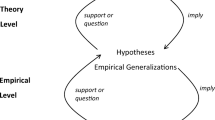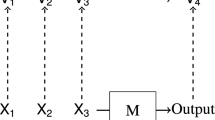Abstract
Bell’s theorem requires the assumption that hidden variables are independent of future measurement settings. This independence assumption rests on surprisingly shaky ground. In particular, it is puzzlingly time-asymmetric. The paper begins with a summary of the case for considering hidden variable models which, in abandoning this independence assumption, allow a degree of ‘backward causation’. The remainder of the paper clarifies the physical significance of such models, in relation to the issue as to whether quantum mechanics provides a complete description of physical reality.
Similar content being viewed by others
References
Y Aharonov, P G Bergmann and J L Lebowitz, Time symmetry in the quantum process of measurement, Phys. Rev. B134, 1410–16 (1964)
F J Belinfante, Measurements and time reversal in objective quantum theory (Oxford, Pergamon Press, 1975)
J S Bell, On the Einstein-Podolsky-Rosen Paradox, Physics 1, 195–200 (1964); reprinted in Bell (1987)
J S Bell, Bertlmann’s socks and the nature of reality, J. Phys. 42, C2-41–C2-62 (1981); reprinted in Bell (1987)
J S Bell, Speakable and unspeakable in quantum mechanics: Collected papers on quantum philosophy (Cambridge University Press, 1987)
J S Bell, J Clauser, M Horne and A Shimony, An exchange on local beables, Dialectica 39, 85–110 (1985)
M A E Dummett, Can an effect precede its cause? Proc. Aristotelian Soc. Suppl. 38, 27–44 (1954)
A Einstein, B Podolsky and N Rosen, Can quantum-mechanical description of physical reality be considered complete? Phys. Rev. 47, 777–80 (1935)
J Lebowitz, Review of H Price, Time’s arrow and Archimedes’ point (Oxford University Press, 1996); Physics Today 1, 68–69 (1997)
H Price, Time’s arrow and Archimedes’ point: New-directions for the physics of time (University Press, New York, Oxford, 1996a)
H Price, Locality, independence and the pro-liberty bell (1996b), preprint archived at http://xxx.lanl.gov/abs/quant-ph/9602020
Author information
Authors and Affiliations
Rights and permissions
About this article
Cite this article
Price, H. Backward causation, hidden variables and the meaning of completeness. Pramana - J Phys 56, 199–209 (2001). https://doi.org/10.1007/s12043-001-0117-6
Issue Date:
DOI: https://doi.org/10.1007/s12043-001-0117-6




